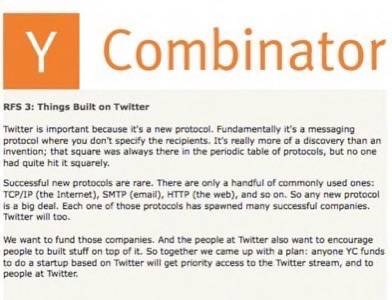If hardcore hackers had any doubts whether the real-time web was a legitimate development environment, Y Combinator co-founder Paul Graham is dispelling them. In an interview with Graham, ReadWriteWeb learned that the entrepreneur-turned-investor issued a “Request for Startups” (RFS) asking for ideas from companies utilizing Twitter and Justin.tv’s live video API. Groups who are accepted to Y-Combinator and fall under these categories will be given “priority access” to Twitter and Justin.tv.

Says Graham, “In the beginning people believed Twitter was a fad and they didn’t realize this was a new protocol…In some ways Twitter is a replacement for email. We’re not doing this to promote Twitter, we genuinely believe it’s important.”

It’s obvious why Y Combinator companies are able to gain special support from Justin.tv’s founders. The lifecasting site took on Y Combinator seed funding in 2007 and has since developed into one of the web’s leading online video destinations. The Twitter partnership is a different story. While it’s important that Y Combinator teams have Twitter’s support, the question on many people’s minds is, “If Twitter is an all-important protocol, then why should one group of investors get privileged access to its data-rich firehose?”
According to Graham, “This is a practical matter. They need to be able to keep ahead of growth technically… If thousands of startups want to talk to you, then you need to have filters. Even before publishing this Request for Startups, we had a dedicated guy at Twitter who answered Y Combinator questions.”
In the past, Y Combinator-funded real-time meta-search engine Scoopler worked closely with Twitter.
Said Graham, “Honestly, Twitter probably has a lot of filters on those who access them. The only thing special about this is that we formalized it with an RFS.”
After taking a $2 million dollar investment from Sequoia Capital in March, Y Combinator aims to increase its portfolio companies from 40 to roughly 60 per year. The “Request for Startups” offers companies direction in their applications.
Graham notes that when individuals apply for Y Combinator, they are asked to specify if they are applying with an RFS in mind. While he estimates that only 10% of applications are directly related to the RFS, he believes that many who might not apply are inspired to do so after seeing their ideas highlighted. The incubator’s first requests were issued in August with a call for alternative journalism and online retail ideas.

















